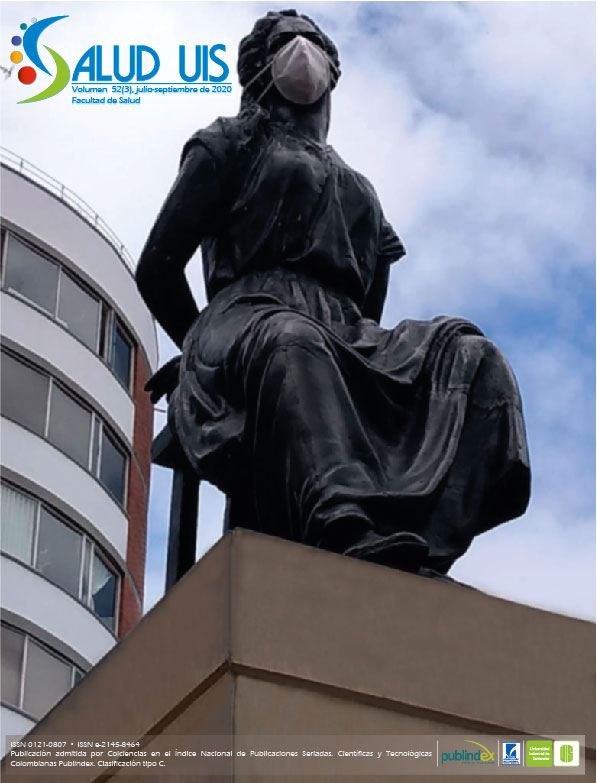Abstract
The behavior modification, such as make habit the use of face masks, physical distancing, hand washing and confinement, in a pandemic situation (as the current one by COVID-19), constitute a challenge for the individual and society, as well this may represent a gain for people’s own health. When the individual isn´t perceived to be at risk in the face of a health condition, nor do they identify its severity, it will hardly generate changes in their behavior. This is more complex when behaviors must change depending on risk groups, as required during the COVID-19 pandemic. When the individual does not perceive himself at risk in the face of a health condition, nor do they identify its severity, it will hardly generate changes in their behaviors, especially when the task must be oriented to modify the behavior according to the risk groups, which it must be done in the presence of COVID-19. Three actions would help in this task: 1) people need to be informed; 2) for people to continue maintaining their behavior they must be gratified for the efforts they make, and 3) the subjects need to be permanently motivated to continue with the behavior change, because the changes have a purpose. These three actions show that behavior change is not only the responsibility of the individual, they occur in a social context, where there are economic and political forces that favor or limit these changes. Thus, the responsibility to prevent the spread of COVID-19 is a shared responsibility.
References
2. Lloyd-Sherlock PG, Kalache A, McKee M, Derbyshire J, Geffen L, Casas FG, Gutierrez LM. WHO must prioritise the needs of older people in its response to the covid-19 pandemic. BMJ. 2020; 368: m1164. doi:10.1136/bmj.m1164.
3. Shim E, Tariq A, Choi W, Lee Y, Chowell G. Transmission potential and severity of COVID-19 in South Korea. Int J Infect Dis. 2020; S1201-9712(20): 30150-30158. doi: 10.1016/j.ijid.2020.03.031 [Epub ahead of print].
4. Kelly MP, Barker M. Why is changing health-related behaviour so difficult? Public Health. 2016; 136: 109-116. doi: 10.1016/j.puhe.2016.03.030
5. Rodrígues A, Leal-Assmar EM, Jablonski B. Preconceito, estereótipos e discriminacao. En: Psicologia social. 29a ed. Petrópoli RJ: Editora Vozes; 2000: 198-240.
6. L. Festinger, A Theory of Cognitive Dissonance (Stanford University Press, 1957): pp. 1-31.
7. Gold RS, Miner KR; 2000 Joint Committee on Health Education and Promotion Terminology. Report of the 2000 Joint Committee on Health education and promotion terminology. J Sch Health. 2002; 72(1): 3-7. doi: 10.1111/j.1746-1561.2002.tb06501.x.
8. DeBarr K. A Review of current health education theories. Californian J Health Promotion. 2004; 2(1): 74-87.
9. United States Department of Health and Human Services. Healthy People 2010: Understanding and Improving Health. 2. Washington, DC: U.S. Government Printing Office; 2000.
10. Sunita S, Fugh-Berman A. Médicos bajo la Influencia: Psicología Social y Estrategias de Marketing de la Industria Social. Rev GPU 2013; 9(4): 427-435.
11. Tajfel H, Turner JC, Austin WG, Worchel S. An integrative theory of intergroup conflict. Organizational identity: A reader. 1979; 56-65.
12. Xiang YT, Yang Y, Li W, Zhang L, Cheung T, Ng Ch. Timely mental health care for the 2019 novel coronavirus outbreak is urgently needed. Lancet Psychiatry. 2020; 7(3): 228-229. doi: 10.1016/S2215-0366(20)30046-8
13. Lima CKT, Carvalho PMM, Lima IAAS, et al. The emotional impact of Coronavirus 2019-nCoV (new Coronavirus disease). Psychiatry Res. 2020; 287: 112915. doi: 10.1016/j.psychres.2020.112915 [Epub ahead of print].
Se autoriza la reproducción total o parcial de la obra para fines educativos, siempre y cuando se cite la fuente.
Esta obra está bajo una Licencia Creative Commons Atribución 4.0 Pública Internacional.

